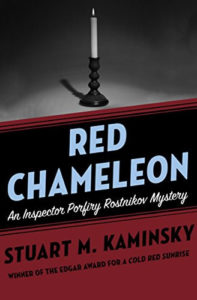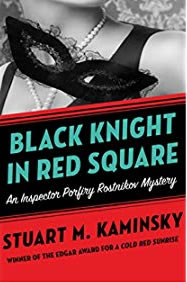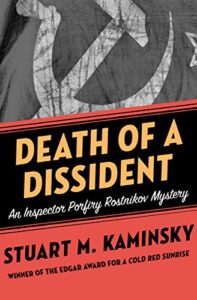
![]() Red Chameleon – This is the third Inspector Rostnikov novel. Published in 1985
Red Chameleon – This is the third Inspector Rostnikov novel. Published in 1985
I found it interesting that the novel mentions the transitions in Soviet leadership through the span of the prior novels, Death of A Dissident (1981) and A Black Knight in Red Square (1983) From Brezhnev to Andropov and then the death of Chernenko. From the climax of the second novel to the start of this third novel finds Chief Inspector Rostnikov demoted to simply Inspector Rostnikov, and it is due to this demotion that Procurator Khabolov, who succeeded Procurator Timofeyeva, assigned Rostnikov, along with his new leg-man the uninspired Comrade Zelach, to investigate an insignificant murder of an old Jew.
“In Moscow, the investigation of a crime is a question of jurisdiction, and the investigation of important crimes is an important question of jurisdiction. Minor crimes, and no one is quite sure what a minor crime is, are handled at the inquiry stage by MVD, the national police with headquarters in Moscow. Moscow itself is divided into twenty police districts, each responsible for crime within its area. However, if a case is considered important enough, a police inspector from central headquarters will be assigned. The doznaniye, or inquiry, is based on the frequently stated assumption that “every person who commits a crime is punished justly, and not a single innocent person subjected to criminal proceedings is convicted.” This is repeated so frequently by judges, procurators, and police that almost everyone in Moscow is sure it cannot be true.”
An old man is murdered in his bath and the only clues that Inspector Rostnikov has to go on is a very old photograph of four young men, and an old brass candlestick was taken from the scene. A very old photo of now very old men… who are they? Where are they? Are they even still alive? Well, at least one of them isn’t alive anymore. But who takes a simple old candlestick? It’s a question, a puzzle that draws the detective in Rostnikov to solve.
Along the way he, like Prometheus, tries to bring that spark to Comrade Zelach and ignite the detective in him.
“Zelach,” he said as they rode up the escalator, “do you think of me as a violent man?”
“No, chief inspector,” said Zelach indifferently. “There’s a stand on the corner. I have not eaten. Would it be all right if I bought some blinchiki?”
“It would be all right, Comrade Zelach,” Rostnikov said sarcastically, but the sarcasm was lost on Zelach. “Do you want to know where we are going?”
Zelach shrugged as they pressed through the morning crowd.
“In that case, we will let that be your surprise for the day.”
Meanwhile, we find our old friend Inspector Emil Karpo investigating a sniper at large in the city, and Inspector Sasha Tkach investigating a series of luxury car thefts. The pursuits of these investigations enable us a readers to again venture through the streets of Moscow and encounter the unique characters that populate the city… hell, this is as enjoyable as dogging Spenser around Boston!


